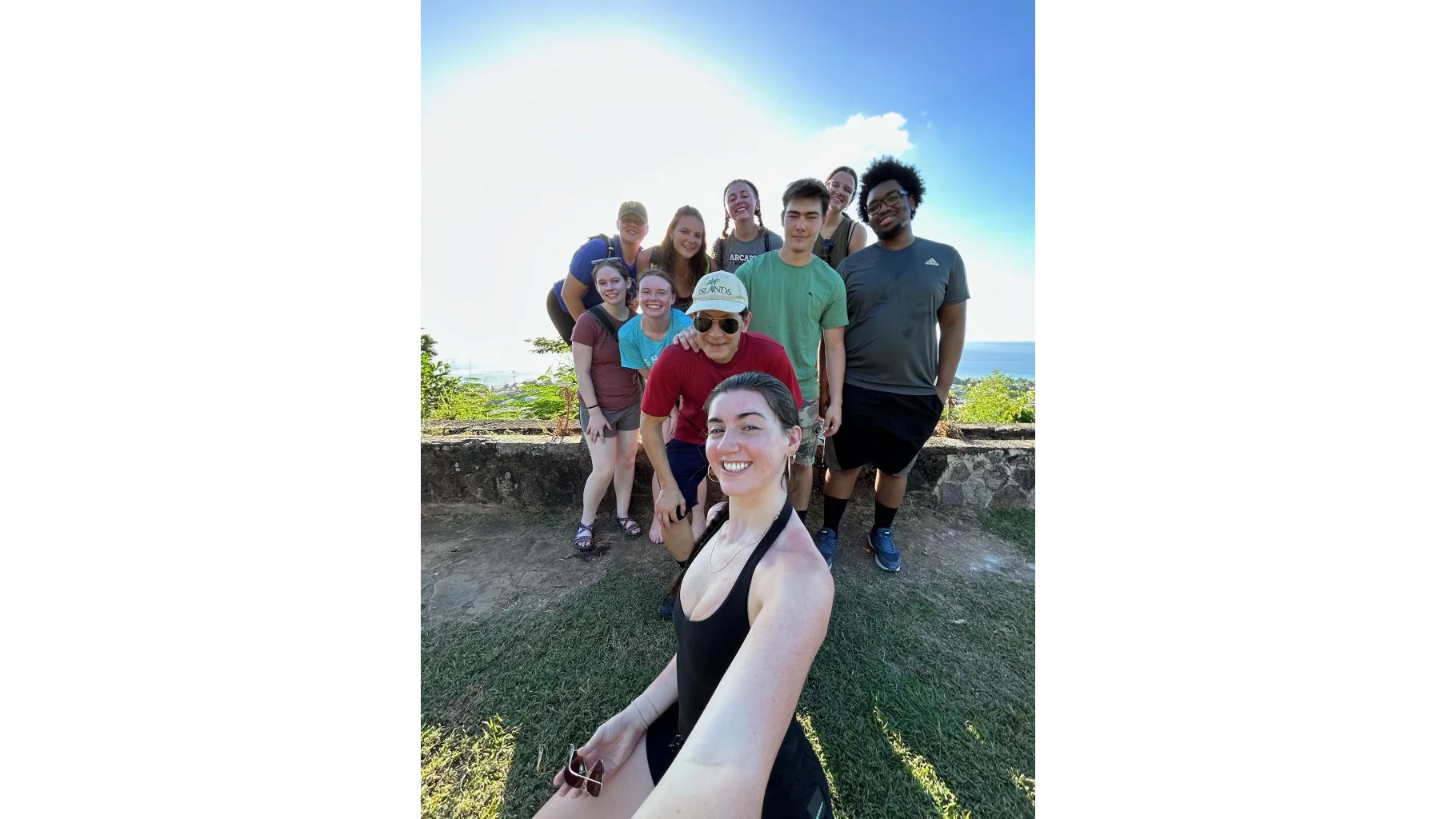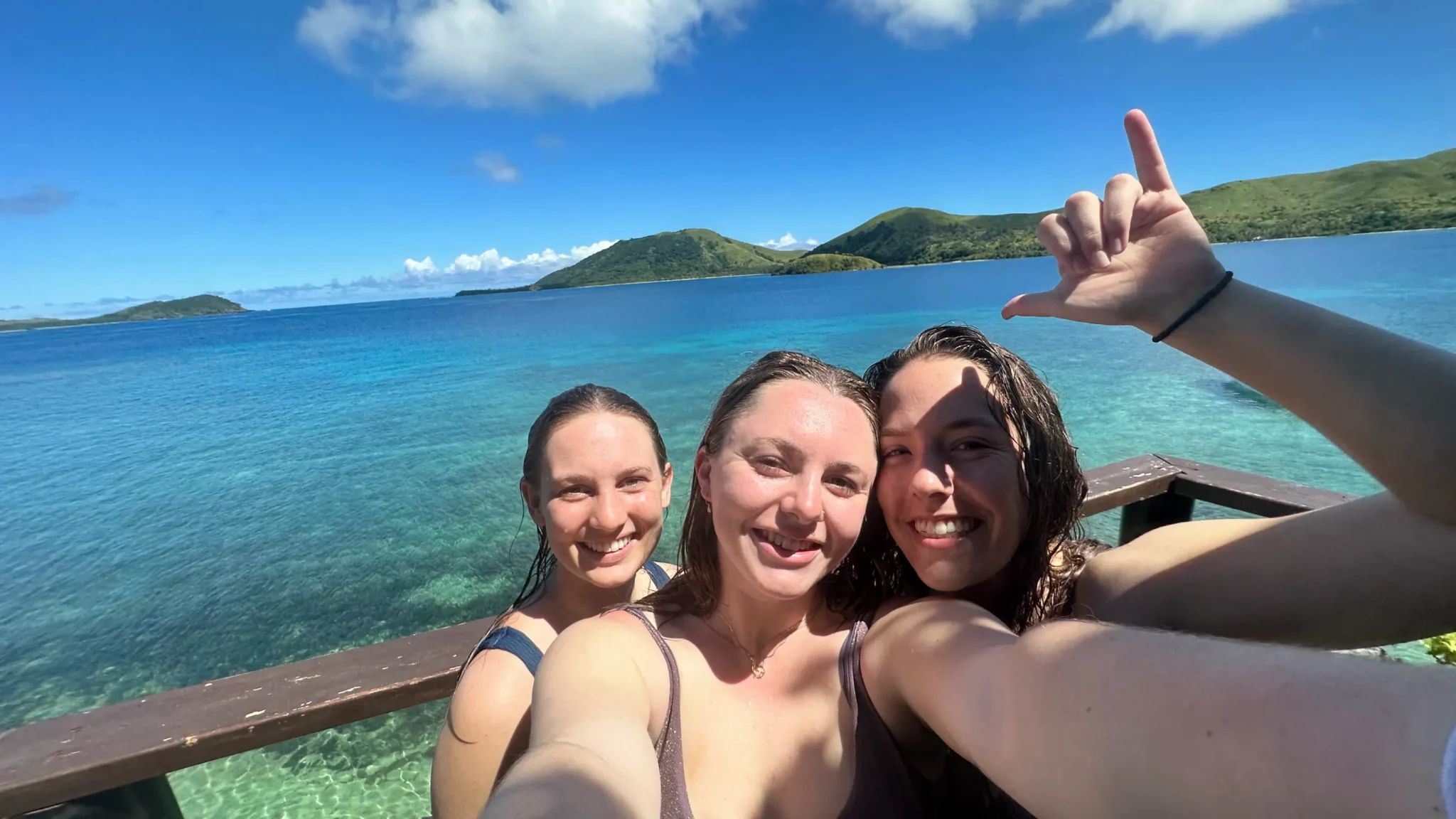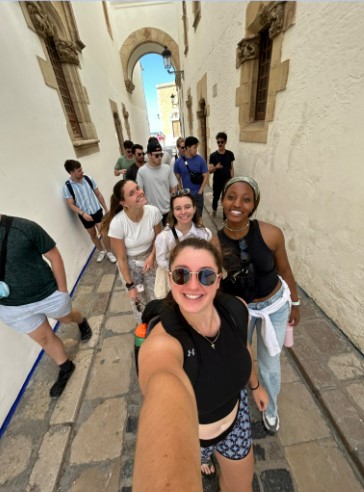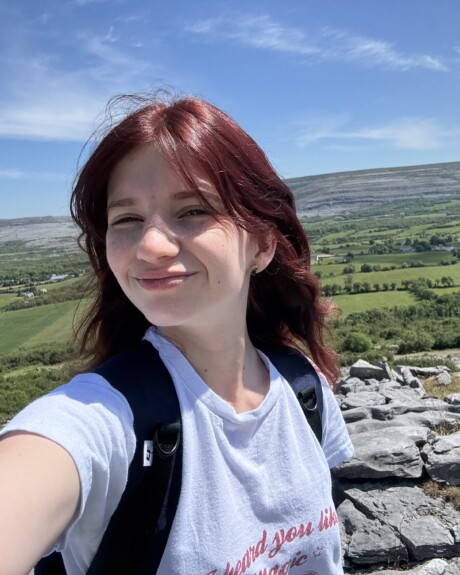


Global Field Studies Course Listing Notes:
- Application: GFS courses are not open to direct registration. Students must submit an application and meet other eligibility requirements. Apply by going to your MyKnight portal and selecting “My Global Opportunities” in the top navigation bar. Once you complete the initial application questions, you will be directed to the Arcadia Abroad Portal where you will be asked to submit a copy of your passport and take a health survey. Please allow at least one hour for your checklist items to appear in the ArcadiaAbroad Portal after submitting the initial application.
- Deposit: Enrollment in GFS courses is on a first-come, first-served basis, and in addition to the GFS application, all GFS applicants must submit a GFS deposit of $300 to finalize registration in their chosen course. This deposit will apply toward the total travel fee for the course and can be paid in person at the Office of Student Accounts or online through Self-Service.
- Subject to Change: Please note that travel locations, dates, and fees are subject to change. For more information, see the Global Field Study FAQs listed below.
- AUC: Many GFS courses fulfill Arcadia Undergraduate Curriculum requirements. These AUC fulfillments are shown in the descriptions below. Any with an asterisk (*) are anticipated but pending final approval.
Spring 2026 Course Offerings
CSI England and Switzerland
Location: London, England & Lausanne, Switzerland
Instructors: Fabio Oldoni & James Allen
Meeting Time: Tuesdays 5.00-6.30pm
Travel Dates: May 16 - May 27, 2026
Travel Fee Range: TBD
AUCs: GE/GR, SS
Description: This course is designed for MSFS students, pre-Forensic Science (3+2 and 4+2) students, Forensic Investigation Minors, and is also pertinent to majors in Criminal Justice, pre-Law, Anthropology, Sociology, Political Science, and History, as well as those with a general interest in crime scene investigations. Since the late 1800s, Switzerland and England have been pivotal in the advancement of forensic science techniques and the establishment of forensic science standards. The growing visibility of forensics in recent media can yield both advantageous and adverse consequences. This course addresses the historical background and evolution of criminal investigations, notable cases, the foundation of international forensic science standards, the roles of forensic scientists and crime scene investigators. An examination of crime investigation processes will compare the practices in the US, Switzerland, and England, highlighting the advantages and disadvantages inherent in each nation's criminal jsutice systems. Additionally, the course will explore how each country is progressing in this intriguing sector of the criminal justice system. To achieve a more thorough understanding of the current role of forensics and its potential evolution within the context of criminal justice, a variety of relevant disciplines and subjects will be considered, including evidence admissibility, the CSI effect, educational aspects, and forensic regulations. Throughout the duration of the course, students will gain perspective on the forensic field as it exists in the US, Switzerland, and England, culminating in a field trip to London and Lausanne.
Open to sophomores, juniors, seniors and graduate students
Mind the Gap: An Analysis of Sustainability Practices in New York, London, and Paris
Location: New York, USA & London, England & Paris, France
Instructors: Dr. Augusto Z Macalalag, Jr. & Dr. Kim Dean
Meeting Time: Tuesdays 4:00 - 6:00 pm
Travel Dates: May 16 - 31, 2026
Travel Fee Range: $3,400 - $3,600
AUCs: GE/GR, NP
Description: The Mind the Gap course will study scientific literacy as students explore sustainability practices in major cities such as NYC, London, and Paris. Scientific literacy entails the ability of individuals to use their knowledge of STEM subjects in order to conduct inquiries and be able to test and evaluate claims based on evidence provided. In this course, students will critically evaluate media sources for the content, credibility, and potential bias surrounding information being offered. We will also discuss scientific belief systems, why people may be resistant to change, as well as how we can utilize evidence-based practice and primary literature to convince others of a discordant viewpoint. As part of studying sustainability practices, students will compare transportation in major cities such as the different modes of transportation, people’s personal choices, costs of transportation and demand, carbon footprint of each choice, and future plan. Students will also observe and document green spaces in both cities, societal use of water, food sources and cultural practices, and garbage and recycling mechanisms. Availability and access to transportation, food, water, green spaces, and others are crucial components of social justice in action.
Open to sophomores, juniors and seniors
Land, Sea and Stars of Hawai’i - FILLED
Location: Hawaii, USA - CLOSED
Instructors: Kimberly Small & Tatjana Miletic
Meeting Time: Mondays 2:30 - 4:00 p.m.
Travel Dates: May 16 - 25, 2026
Travel Fee Range: $3,200 - $3,500
AUCs: GE/GR, NP
Description: This is an interdisciplinary, STEM course that studies land, sea and stars of Hawai’i as well as cultural history related to Hawaiian language and science, culminating in a 10 day trip to Big Island of Hawai’i. Students develop awareness of mindful tourism. Places of interest to visit are: Volcano National Park, Mauna Kea Observatory, lava flow sites and marine life along the coast of Big Island of Hawaii. Imiloa means “to seek far” and is a Hawaiian word for both to explore and explorer. We are adopting Imiloa meaning and while studying Hawaiian land, sea and sky we explore and rethink our place in the Universe.
Open to sophomores, juniors, seniors and graduate students
Greece: Labyrinth, Lore, and Landscape - FILLED
Location: Greece - CLOSED
Instructors: Allyson McCreery & Rhianon Visinsky
Meeting Time: Tuesdays, 7:00 - 10:00 p.m.
Travel Dates: May 16 - 26, 2026
Travel Fee Range: $2,800 - $3,000
AUCs: CE. VL, CABR, GE/GR
Description: The landscape of Greece invites people into a labyrinth where myths, ancient civilizations, and philosophical concepts merge to form lasting impressions. In this course, students will examine the myths and literature of Classical Greece as well as other ancient civilizations that flourished from the Bronze Age to the Hellenistic Period of Ancient Greece. This examination will be guided by the application of Geocritical Theory and Arcadian Thought, which encourage in-depth analyses of spatiality, power, and hierarchical relationships in texts and physical contexts. In Greece, students will not only explore ancient sites and civilizations, but the legacy of justice, democracy, and the pursuit of knowledge that Ancient Greece introduced to the Western World.
Open to sophomore, juniors, seniors and graduate students
Exploring National Identity in Central Europe - FILLED
Location: Munich and Nuremberg, Germany & Vienna, Austria - CLOSED
Instructors: Christopher Cerski & Angela Kachuyevski
Meeting Time: Tuesdays & Thursdays 4:00 - 5:40 p.m.
Travel Dates: May 16 - 30, 2026
Travel Fee Range: $3800 - $4390
AUCs: GE/GR, CL
Description: This course will study how nation-states develop a common national identity and its importance to governmental power. Students will develop an awareness about a nation-state's use of visual culture to form or project a national identity. This course will study the cultural artifacts that have been used throughout history to form national identity and national narratives, including architecture, monuments, memorials, and art. Students will visit Munich/Nuremberg, Germany and Vienna, Austria, and read an array of sources that examine the importance of capital city architecture, memorialization of key historical monuments, as well as the use of museums to preserve artifacts and art that construct national narratives, identity, and history. Before exploring the international sites, students will examine the United States' national identity and visit Washington, D.C. to explore how our government uses architecture, monuments, memorials, and art to construct an American identity that shapes the country's cultural and historical narratives.
Open to sophomore, juniors and seniors
Paris Noir: African-American Writers in the City of Light
Location: Paris, France
Instructors: Rachel Collins & Michael Dwyer
Meeting Time: Thursdays 4:00 -6:50 p.m.
Travel Dates: May 16-24, 2026
Travel Fee Range: $3,300-3,600
AUCs: GE/GR, CL, CABR
Description: This course examines the experiences and writing of African American authors, artists, and intellectuals who spent time living in Paris as visitors, expatriates, immigrants, or exiles. Some traveled in Paris for a period of weeks or months, while others chose to spend the rest of their lives in France. The central questions we'll explore include: how did these individuals' immersion in French culture bring the contours of their American experiences and identities into sharper focus-- especially around issues of race and power? What did Richard Wright mean when he said “I tell you frankly that there is more freedom in one square block of Paris than in the entire United States of America!” Why did Jessie Fauset say, “I like Paris because I find something here, something of integrity, which I seem to have strangely lost in my own country.” The class primarily focuses on 20th century authors (like James Baldwin, Richard Wright, Langston Hughes, Jessie Redmon Fauset, etc.), though we study some 19th and 18th century figures, too (Frederick Douglass, Victor Sejour, Sally Hemmings). Readings include fiction, poetry, memoirs, diaries, and more.
Open to sophomore, juniors, seniors and graduate students
Field Biology: The Florida Everglades, America's River of Grass
Location: Florida Everglades and Key Largo
Instructors: Lauretta Bushar & Christopher Binckley
Meeting Time: Tuesday 12:15-1:20 pm
Travel Dates: March 14-21, 2026
Travel Fee Range: $2,400 - $2600
AUCs: GE/GR
Description: In this course students will explore the biodiversity of the Florida Everglades, specifically how changing hydrology affects fresh-water and coastal habitats. Analysis and discussion of primary literature will illustrate characteristics of plant and animal communities. The Everglades is a river slowly flowing from Lake Okeechobee to the Florida Bay, containing an immense diversity of plants and animals. Students will explore, document, and analyze these species, focusing on how hydrology affects their distribution and abundance. This course includes an immersive 8 day trip to Everglades National Park and the Florida Keys, where students will follow the flow of water and explore Everglades ecology in field trips, a museum, and the collection and analysis of ecological data. Students must be able to hike on flat land for several hours to complete the field investigations. This course fulfills the biology major requirement of a 300-level biology course in the area of Ecology, Evolution, and Population Biology with a laboratory or field component. Fee covers the cost of airfare, lodging, most meals, and all field excursions including snorkeling trip.
Prerequisites: Successful completion of BI242 and either BI201 or BI204; if there is room in the course, students may be taking one of these concurrently with permission of the instructors. Preference will be given to students who have completed these requirements.
Fall 2025 Course Offerings
GFS 308: Dominica
Location: Roseau, Dominica
Instructor: Thomas Brinker & Cynthia Planita
Meeting Time: Tuesdays 2:10-3:50pm
Anticipated Travel Dates: January 3-10, 2026 (7 nights)
Travel Fee Range: $3,175 – $3,475
AUC Fulfillment: GE / GR, SS
The trip to Dominica will take you out of your comfort zone and will strengthen you in more ways than you can imagine. It will open your mind and give you the chance to really see how other cultures live. Less developed regions of the world can be difficult to witness firsthand, but there’s no better way to change your perspective on life than to witness how little people in the rest of the world have and live with on a daily basis. Moreover, you will have an opportunity to visit and interact with factories, power plants, organic farming, community leaders, politicians, entrepreneurs, local citizens and high-ranking civil servants.
Developing countries are in the midst of economic and cultural upheaval; they are always changing and Dominica is no exception, especially after Tropical Storm Erika, Hurricane Maria and the Covid Pandemic. This small island nation is undergoing a massive transformation in the areas of commerce, infrastructure and politics. Studying in an area where poverty is high usually means educational opportunities are low, which also means that there are plenty of opportunities to lend a helping hand. We will be including community service activities throughout our stay.
No academic pre-requisites but must be of junior or senior standing.
Shakespeare and Modern Identity: Here and There, Then and Now
Location: London, England
Instructor: Jonathan Shandall & Krista Apple
Meeting Time: Mondays 6:00-8:00pm
Anticipated Travel Dates: January 1-11, 2026
Travel Fee Range: $3,500-3,800
AUC Fulfillment: CL, GE/GR
The popular scholar Harold Bloom argues, “We keep returning to Shakespeare because we need him; no one gives us so much of the world we take to be fact. .. Our ideas as to what makes the self authentically human owe more to Shakespeare than ought to be possible.” This course will test the ongoing validity of Bloom’s argument—seeking insight into Shakespeare’s knack for a mirror up to human nature and showing us the full range of our authentic human selves today.
The fall course will blend traditional classroom discussions with “on your feet” studio sessions in which students will learn by bringing Shakespeare’s plays to theatrical life through artistic exploration that’s inclusive of all levels of theatrical experience. Throughout, we will interrogate how centuries old dramas continue to resonate with contemporary truths about race, gender identity, sexual orientation, and human agency within our times. Both in the US and in England, we will engage with Shakespeare from multiple angles: as literary texts, as artistic blueprints, and as cultural phenomena on stage and film, through engagement with professional art and artists on both sides of the Atlantic.
A culminating trip to London will deepen our exploration of Shakespeare’s historical and contemporary salience and our creative, embodied exploration of the truths contained within his characters. We will visit historic sites associated with Shakespeare’s age and career, attend theater productions, and engage with professional artists and scholars at sites including but not limited to: Buckingham Palace, Covent Garden, Westminster Abbey, the Victoria & Albert Museum, Shakespeare’s Globe,the National Theatre, the Royal Shakespeare Company, and the British American Drama Academy.
Open to sophomores, juniors and seniors
Global Field Study Frequently Asked Questions
What are Global Field Study Courses?
Global Field Studies (GFS) are 4-credit semester-long courses with a global focus and planned travel component. They are open to juniors and seniors, and sometimes sophomores and graduate students. They can meet major requirements and carry AUC designations. Some courses have prerequisites or other eligibility requirements; see course descriptions for details. Graduate students earn 3 grad-level credits for GFS courses.
Who is eligible to participate in the GFS courses?
- Full and part-time matriculated juniors and seniors. Some courses accept sophomores and graduate students.
- Transfer students who have completed at least one semester (a minimum of 12 credits) of coursework at Arcadia.
- See course descriptions for details on prerequisites and additional eligibility requirements.
How do I apply for and enroll in a GFS course?
GFS courses are not open to direct registration and appear closed in Self-Service. This is because students must submit an application and meet other eligibility requirements. You can apply for a GFS course by going to your MyKnight portal, clicking on "Global Opportunities," then completing the form. Once you have completed this first step, go to your ArcadiaAbroad Portal through PortalGuard where you will need to submit your additional checklist items. Please allow at least one hour for your checklist items to appear in the ArcadiaAbroad Portal after submitting the initial application.
Enrollment in GFS courses is on a first-come, first-served basis, and in addition to the GFS application, all GFS applicants must submit a GFS deposit of $300 to finalize registration in their chosen course. This deposit will apply toward the total travel fee for the course and can be paid in person at the Office of Student Accounts or online through Self-Service.
How are the Field Study topics and location focuses chosen?
Each semester, Global Engagement puts out a call to Arcadia faculty and staff for Global Field Study course proposals. The courses we offer are based on the research interests and expertise of our faculty and staff who lead them. We strive to offer a varied slate of courses, based in different academic disciplines and in different corners of the world, including North America.
What are GFS Travel Fees?
Global Field Study courses carry a travel fee, in addition to your regular tuition. The travel fee range for courses will be listed on the GFS Courses page. Payments can be made online via Self-Service/eBill, or you may pay by cash or check at the Office of Student Accounts. Make checks payable to Arcadia University.
GFS travel fees vary by course and will be finalized early in the semester the course runs. Total fees depend on the location and the length of the field study. The travel fee typically includes:
- Airfare
- Accommodations
- In-country ground transportation
- All tours, lectures, and group activities
Travel fees can be paid in installments through any method you usually use to pay account charges. Other cost details specific to your field study location will be outlined by your faculty leader.
Can I drop a GFS course?
The drop period for GFS courses ends one day (24 hours) after your first class meeting. At that time, you will be responsible for the entire amount of the travel fee for your GFS course, even if you later withdraw. In most cases, students who drop a course before it begins will not be refunded their GFS deposit because the university will have incurred costs on the students' behalf.
Please see this excerpt from the Global Field Study Enrollment Agreement pertaining to the drop policy for GFS courses:
I understand that the drop period for GFS courses ends one day (24 hours) after my first class meeting. After the 24-hour drop period, the travel fee for the GFS course will be placed on my student account and must be paid in full 2 weeks before the end of the semester in which the course travels. The travel fee will remain my responsibility to pay even if I withdraw from the GFS course at any point during the semester after the initial 24-hour drop period. Withdrawals or dismissals from the program for academic or disciplinary reasons are subject to additional fees for non-recoverable expenses.
What if it's not possible to travel to the planned field study location?
Sometimes, Arcadia needs to change travel plans in order to keep everyone as safe as possible. Please read this excerpt from the Global Field Study Enrollment Agreement with more information:
Arcadia University reserves the right to cancel, alter, suspend, or amend any part of any program or to increase fees should circumstances make these actions advisable or necessary. I understand that the program calendar dates posted on the Arcadia University website are tentative in nature, and can change at any time. Arcadia University will alert me of any such changes and will work to minimize any disruption to my planning.
Cancellations / Refunds
In the case of the total cancellation of your course, students will be refunded any monies paid toward the course. If a course continues but the field study portion is altered, students may be responsible to pay alternate programming costs necessary to meet the academic goals of the course, such as local excursions and guest speakers, etc. Students will be informed in a timely manner about these fees.
How do I pay for GFS?
Students can pay online through Self-Service or in person at the Office of Student Accounts, 777 Building.
When paying in person, please request and keep a receipt for your payment. Please email globalengagement@arcadia.edu to let us know that you have submitted your payment in person. If you have an account balance of at least the amount you need to pay, you can request that transfer by emailing the Office of Student Accounts and cc me: busoffice@arcadia.edu
Online payment process:
-
Log in to Self-Service
-
Click “Finances” tab
-
Click “View e-bill and pay”
-
Select “Make a payment” from the left side menu
-
Choose the correct payment from the “Available Items” section
-
Continue through checkout process using credit card (fee applies) or electronic check (no fee)
-
Keep the payment confirmation email you’ll receive once payment is submitted
Passports
Do I need a passport or visa for a GFS course?
Passports are required for all international travel, and you will need to submit a copy to Global Engagement. We strongly recommend that students request expedited passport processing (additional fee applies) for new passport applications and renewals because regular processing time is approximately 3 months. If you currently have a passport, be sure the expiration date is at least 6 months after your return date.
Passport Application and Documentation
Passport application available through the U.S. State Department website.
Please see this excerpt from the Global Field Study Enrollment Agreement on travel documentation, including valid US passports:
Proper Travel Documentation:
I understand that it is my responsibility to have all travel documents necessary for domestic and/or international program travel. For international travel, this includes a valid passport for the duration of my time abroad and for any required amount of time after I return as stipulated by the immigration policy of my host country. I agree to obtain any and all visa and clearances prior to my time abroad and ensure I have obtained the proper authorization to study in my host country. I understand that Arcadia University is not responsible for any decisions made by foreign embassies or consulates regarding approval of visa documentation and/or immigration clearance. I understand that the failure to obtain appropriate travel documents may result in my removal from the program and that I will be responsible for the travel fee and any additional non-recoverable costs incurred by Arcadia University on my behalf.
Passport Processing
Need a passport? All international travel will require one, and processing time is around 12 weeks, so apply now! Visit travel.state.gov for application information. Email globalengagement@arcadia.edu with questions.




